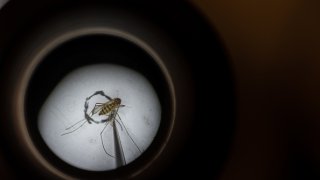
An emu that died had Eastern equine encephalitis and this was the first case of EEE in a domestic animal in the state this year, according to the Connecticut Department of Agriculture.
The 10-year-old male emu was in Windham County and showed neurological signs when it died.
The Department of Agriculture said diagnostic samples were sent to the Connecticut Veterinary Medical Diagnostic Laboratory at the University of Connecticut in Storrs and tested positive for EEE virus.
Get Connecticut local news, weather forecasts and entertainment stories to your inbox. Sign up for NBC Connecticut newsletters.
EEE is not spread horse-to-horse or horse-to-human, the Department of Agriculture said. It is a viral disease transmitted through the bites of mosquitoes.
“This detection highlights the importance of vaccinations and continued precautions that owners should undertake to protect their animals from mosquito-borne illnesses,” Connecticut State Veterinarian Dr. Jane Lewis said in a statement. “Horses are the domestic animals most susceptible to infection with mosquito-borne illnesses such as EEE.”
The Connecticut Agricultural Experiment Station has detected EEE-infected mosquitoes in: Hampton, Killingly, Thompson, Tolland, Voluntown, and Woodstock.
Local
West Nile virus-infected mosquitoes have been found in 33 Connecticut towns this season: Bethel, Branford, Bridgeport, Colchester, Danbury, Darien, East Haddam, East Haven, Fairfield, Glastonbury, Greenwich, Hartford, Hebron, Killingworth, Manchester, Mansfield, Middlefield, Milford, New Canaan, New Haven, North Stonington, Norwalk, South Windsor, Stamford, Tolland, Wallingford, Waterbury, Waterford, West Haven, Westport, Wethersfield, Willington, and Wilton.
Horse owners are encouraged to implement the following, in coordination with their veterinarian, including:
- Administering the initial two-dose vaccine series, four to six weeks apart
- •Administer regular boosters at least annually
- Consult with your veterinarian if boosters are needed every six months
- Give vaccinations at least one month prior to mosquito season to develop protective immunity
- Remove sources of standing water to eliminate mosquito breeding grounds
- Clean and refill water troughs regularly
- Apply fly sprays containing pyrethrin regularly
If your horse is showing neurologic signs, i.e., hyperexcitability, tremors, convulsions, paralysis, head tilt, head pressing, incoordination, drowsiness, recumbency, colic, or death, it’s important to call a veterinarian to determine a diagnosis and treatment.
Neurologic diseases of domestic animals, such as EEE, West Nile virus and rabies, are reportable to the state veterinarian at 860-713-2505.



